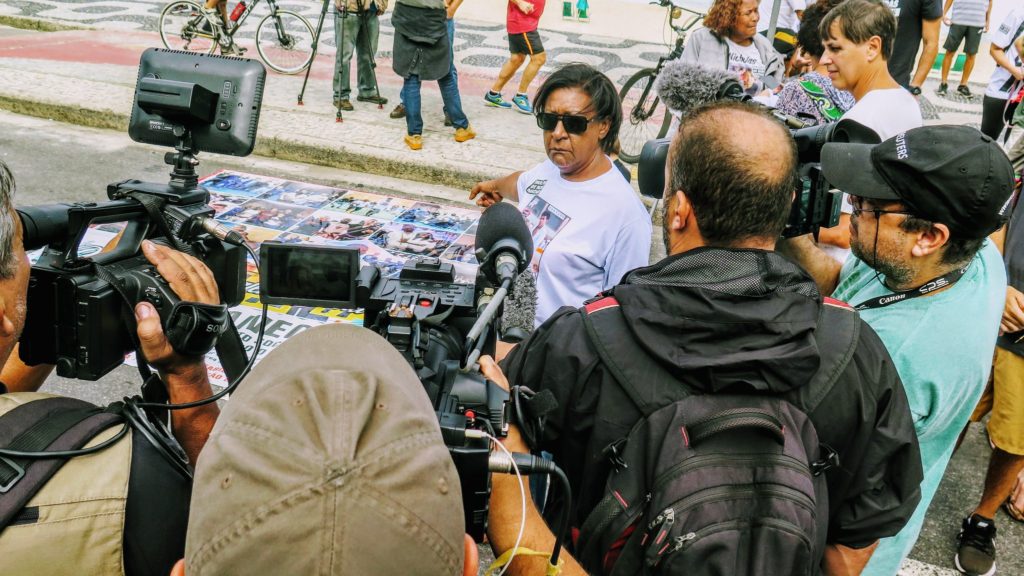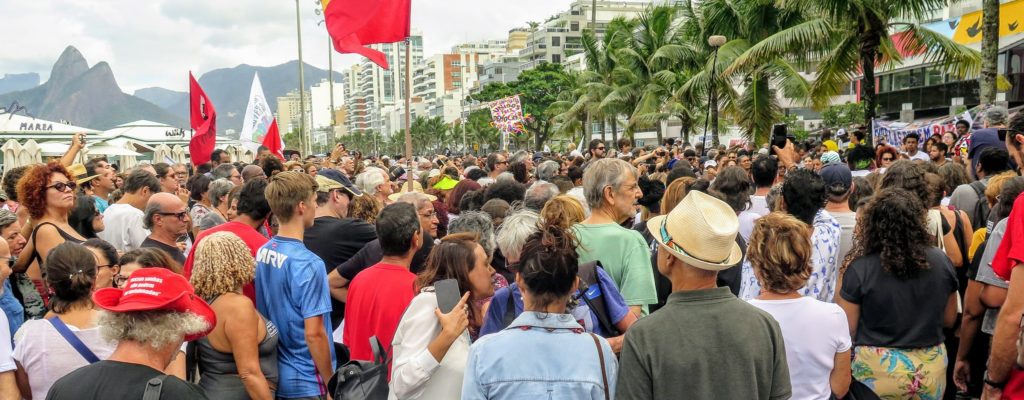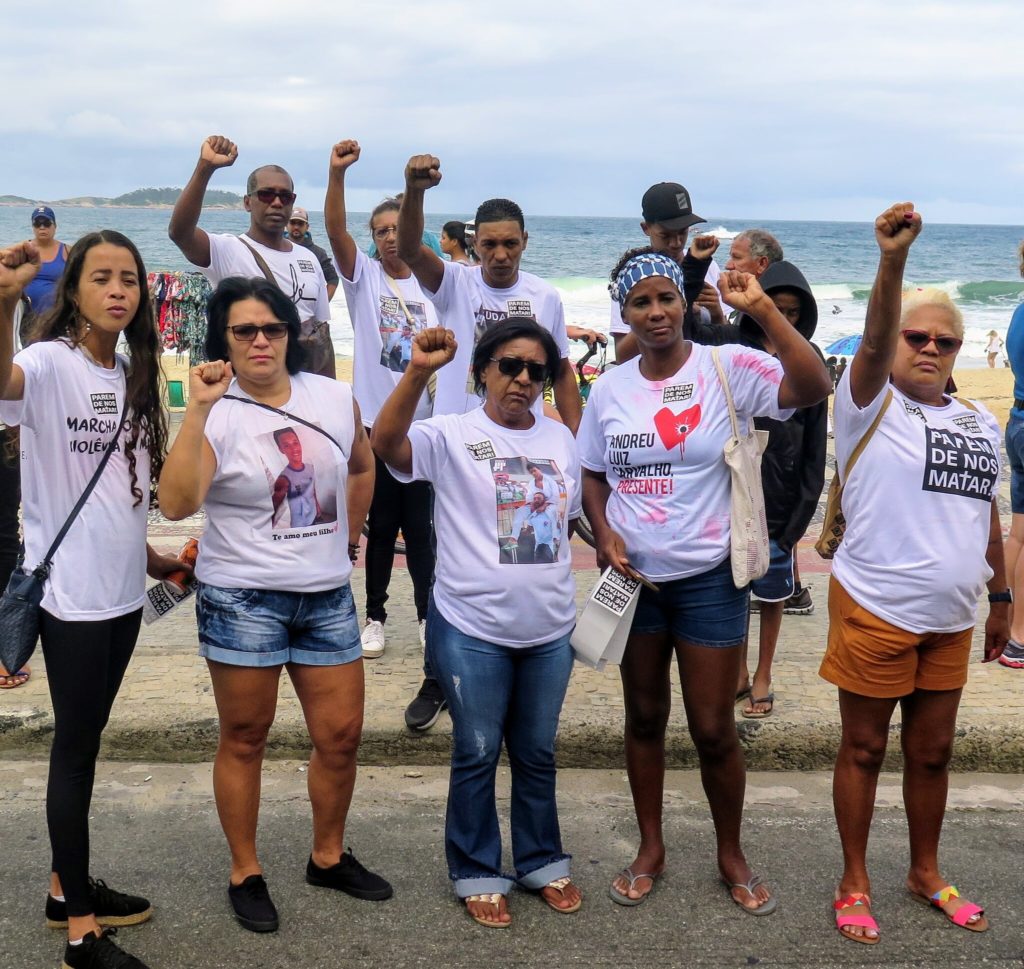RIO DE JANEIRO, BRAZIL – This past Sunday, May 26th, was a day of protest in Brazil. Dominating the headlines were discussions of the size and significance of the various pro-Bolsonaro demonstrations and marches in cities all over the country. But another protest, which looks set to be the start of a new movement begun by Rio’s increasingly organized favela community residents, also took place on the beachfront of Ipanema.

Theresa Williamson, urban planner and executive director of the favela advocacy organization Catalytic Communities, and Bárbara Nascimento, teacher, community activist and one of the first organizers of the “Parem de Nos Matar” (Stop Killing Us) protest, spoke with The Rio Times about the origins of the rally, its significance, and how it is the start of a new campaign to stop the indiscriminate killing of favela community residents by armed police.
“We have been witnessing, with grave concern, the implementation of Rio de Janeiro’s current state and federal public security policies,” comments Williamson.
She points out that according to data from the “Instituto de Segurança Pública” (Public Security Institute), published by the Extra Journal, the first quarter of 2019 registered 434 homicides resulting from police actions, an average of four deaths per day and an increase of 18 percent over the previous year.
Sunday’s protest, and the wider “Parem de Nos Matar” (Stop Killing Us) movement, was born directly out of the recent spate of killings that have affected residents of key favela communities including Vidigal and Complexo do Alemão.
The killings of high-profile community members also brought home the brutal reality of Governor Wilson Witzel’s newly sanctioned “shoot-to-kill” policy to the broader public.
“This protest began when William was killed in Vidigal,” comments Williamson. An innocent “gari” (street cleaner), William was involved in the clean-up efforts after April’s lethal storms, helping to save people caught in their homes during mudslides.
She continues: “A few weeks later, the police just shot him. And so, this group of residents who are very organized within Vidigal, decided to start a WhatsApp group called “Parem de Nos Matar” (Stop Killing Us) and invited all the other community organizations in favelas across Rio to join them.”

Organizer Bárbara Nascimento comments on the protest’s aims: “We wanted the wider society to become aware of the deadly toll on innocent people these police operations in favelas bring.”
Nascimento adds: “We also realized that we couldn’t just protest within the favelas. We had to develop a coalition between favela organizers and middle-class people in the city to call for an end to such operations.”
Along with putting a stop to extra-judicial killings and increased police violence within favela communities, the organizers also have the specific aim of halting armed police operations during school hours when children are most at risk.
Both interviewees commented on how incredible the size and breadth of this action has been – an almost unprecedented coming-together of a geographically vast and diverse group of concerned individuals.
“It started with a few people in Vidigal but quickly ballooned to around 79 favela-based organizations across the city,” Nascimento comments.
Williamson is quick to point out how this protest stands in stark contrast to that of the usual union-led or well-funded demonstrations that are commonly seen on Brazil’s streets: “The entire protest was organized by favela organizers, which was amazing and inspiring.”
She continues: “This was a huge protest centered around an issue that people often feel scared to speak up about. Moreover, it was not organized by a union or an NGO, nor it was organized with a lot of resources or funding.”
“I think it’s an interesting contrast to the pro-Bolsonaro protests, which were massively funded and centrally-organized by powerful groups,” Williamson adds.

She was also keen to stress the unbelievable escalation of violence that is currently occurring within the city. Over the past few weeks, two people who were in Catalytic Communities’ extended network of organizers were killed by the police in two separate operations.
“I mean, this is what we’re seeing right now. There’s essentially an extermination campaign that’s been launched by the governor with support from the president. That’s what’s happening, and that’s why people are organizing like never before,” she comments.
For the “Parem de Nos Matar” (Stop Killing Us) organizers, this looks to be an exciting phase. They’ve shown they can initiate large grassroots protests that unite residents of favela communities and those living “on the asphalt” [in urbanized areas] in Rio de Janeiro.
“They’re planning to start forums and debates across favela communities, across the city, about different political issues. Lots will come out of this effort,” Williamson concludes. “This is not a one-off protest – it’s the beginning of a massive campaign, and again, it’s completely launched and run by favela community organizers.”

